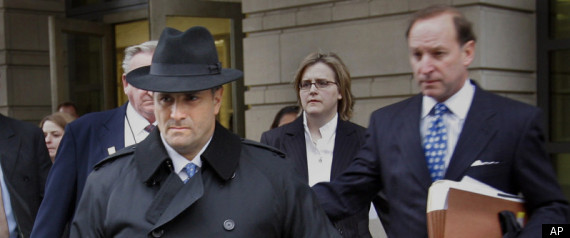 WASHINGTON -- Former superlobbyist and ex-con Jack Abramoff describes himself in his forthcoming book as a creature of a corrupted system.
WASHINGTON -- Former superlobbyist and ex-con Jack Abramoff describes himself in his forthcoming book as a creature of a corrupted system."I wasn't the only villain in Washington," he writes in the book set for release on Nov. 1. Abramoff cops to the de facto bribery of public officials -- but writes that such conduct is "the way the system works."
The book, "Capitol Punishment: The Hard Truth About Washington Corruption From America's Most Notorious Lobbyist," was published by WND Books -- a division of the "birther" website WorldNetDaily.com. The Huffington Post received an advance copy.
Abramoff describes how he "lavished contributions, meals, event tickets, travel, golf and jobs on innumerable federal public officials with the expectation or understanding that they would take official actions on my behalf or on behalf of my clients."
"As a lobbyist, I thought it only natural and right that my clients should reward those members who saved them such substantial sums with generous contributions," he writes. "This quid pro quo became one of hallmarks of our lobbying efforts."
He also describes wooing congressional staffers -- particularly chiefs of staff -- with the lure of future employment. "After a number of meetings with them, possibly including meals or rounds of golf, I would say a few magic words: 'When you are done working for the Congressman, you should come work for me at my firm.'
"With that, assuming the staffer had any interest in leaving Capitol Hill for K Street -- and almost 90 percent of them do, I would own him and, consequently, that entire office. No rules had been broken, at least not yet. No one even knew what was happening, but suddenly, every move that staffer made, he made with his future at my firm in mind."
Abramoff points out that he was "not alone in this method" and that "it continues today, unabated by reform campaigns or public ire at the Congress."
Abramoff was the central figure in a wide-ranging public corruption and influence-peddling scandal. He pleaded guilty in January 2006 to fraud, tax evasion and conspiracy to bribe public officials, and served three years and seven months in prison before his release last June.
His business partner, Kevin Ring, was sentenced to 20 months in prison just this past Wednesday -- the 21st person, including one congressman and two Bush White House officials, to either plead guilty or be found guilty in the scandal.
In the book, Abramoff mocks the ethics reforms adopted by Congress in the wake of his downfall.
"Is corruption in Washington really ended by insisting congressmen eat their food with their fingers standing up, rather than seated with forks and spoons? Yet, this is the kind of reform which Congress proposes, passes, and then congratulates itself about," he writes.
That's not to say reform bills aren't good for anything. "No bill is more likely to pass than a reform bill," he writes, "so smart lobbyists always keep an eye out for reform bills."
But Abramoff reserves his most scathing criticism for the members of Congress who never complained when he showered them and their staff with money and gifts -- then self-righteously hung him out to dry.
Abramoff famously remained silent -- taking the Fifth -- when he was called to testify before the Senate Indian Affairs Committee in September 2004. In his book, he hints at what he might have said had he opened up.
"Most of these legislators had taken thousands of dollars from my clients and firms, and now they were sitting as impartial judges against me. Washington hypocrisy at its best," he writes. "Members swim in a swamp of corruption, and thrive in it, but they are able -- with a straight face no less -- to accuse others at will and sanctimoniously punish what they see as malfeasance."
And finally Abramoff shares his own plan -- concocted as he "paced the track ... day after day" at Cumberland Federal Prison in Maryland -- to end the undue influence of special interests. (Although, he writes: "I know that, barring a torch and pitchfork uprising, no real changes will occur.")
He proposes that anyone who lobbies the government, receives federal contracts or benefits from public funds should be entirely prohibited from making campaign contributions or giving any gifts at all to public officials.
To end the revolving door, "the lure of post-public service lobbying employment needs to be eliminated," he writes. So: "If you chose to serve in Congress or on a congressional staff, you should be barred for life from working for any company, organization, or association which lobbies the federal government. "
He also supports term limits. (As a lobbyist, "I didn't want to have to build relationships with new members constantly," he writes.) He furthur proposes that senators no longer be elected directly -- but rather by their state houses -- and that no representative be allowed to propose, lobby for or even vote on projects in their own districts.
But Abramoff still remains very much a movement conservative, and he puts the fundamental blame for corruption not on flawed laws or weak people -- but on big government.
"The reason there are tens of thousands of lobbyists is because the ever-expanding federal government creates ever-increasing opportunities for abuse," he writes. "The more the federal government does, the more lobbyists there will be to protect special interests at the expense of the common interest."
For years, Abramoff has routinely been described as "disgraced" -- the walking embodiment of political corruption. But he is being feted with a book party at the home of Daily Caller editor Tucker Carlson in November -- potentially a sign that, at least in some political circles, redemption is at hand.
Origin
Source: Huff
No comments:
Post a Comment